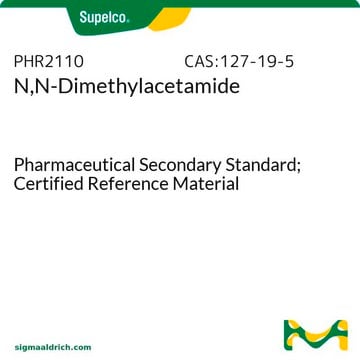About This Item
Recommended Products
vapor density
3 (vs air)
vapor pressure
2 mmHg ( 25 °C)
4 mmHg ( 38 °C)
grade
puriss. p.a.
Assay
≥99.5% (GC)
form
liquid
autoignition temp.
914 °F
expl. lim.
1.8 %, 100 °F
11.5 %, 160 °F
impurities
≤0.1% water
evapn. residue
≤0.005%
refractive index
n20/D 1.437 (lit.)
n20/D 1.437
pH
4 (20 °C, 200 g/L)
bp
164.5-166 °C (lit.)
mp
−20 °C (lit.)
density
0.937 g/mL at 25 °C (lit.)
cation traces
Al: ≤0.5 mg/kg
Ba: ≤0.1 mg/kg
Bi: ≤0.1 mg/kg
Ca: ≤0.5 mg/kg
Cd: ≤0.05 mg/kg
Co: ≤0.02 mg/kg
Cr: ≤0.02 mg/kg
Cu: ≤0.02 mg/kg
Fe: ≤0.1 mg/kg
K: ≤0.5 mg/kg
Li: ≤0.1 mg/kg
Mg: ≤0.1 mg/kg
Mn: ≤0.02 mg/kg
Mo: ≤0.1 mg/kg
Na: ≤0.5 mg/kg
Ni: ≤0.02 mg/kg
Pb: ≤0.1 mg/kg
Sr: ≤0.1 mg/kg
Zn: ≤0.1 mg/kg
SMILES string
CN(C)C(C)=O
InChI
1S/C4H9NO/c1-4(6)5(2)3/h1-3H3
InChI key
FXHOOIRPVKKKFG-UHFFFAOYSA-N
Looking for similar products? Visit Product Comparison Guide
General description
Application
Signal Word
Danger
Hazard Statements
Precautionary Statements
Hazard Classifications
Acute Tox. 4 Dermal - Acute Tox. 4 Inhalation - Eye Irrit. 2 - Repr. 1B
Storage Class Code
6.1C - Combustible acute toxic Cat.3 / toxic compounds or compounds which causing chronic effects
WGK
WGK 2
Flash Point(F)
147.2 °F - closed cup
Flash Point(C)
64 °C - closed cup
Certificates of Analysis (COA)
Search for Certificates of Analysis (COA) by entering the products Lot/Batch Number. Lot and Batch Numbers can be found on a product’s label following the words ‘Lot’ or ‘Batch’.
Already Own This Product?
Find documentation for the products that you have recently purchased in the Document Library.
Customers Also Viewed
Our team of scientists has experience in all areas of research including Life Science, Material Science, Chemical Synthesis, Chromatography, Analytical and many others.
Contact Technical Service








